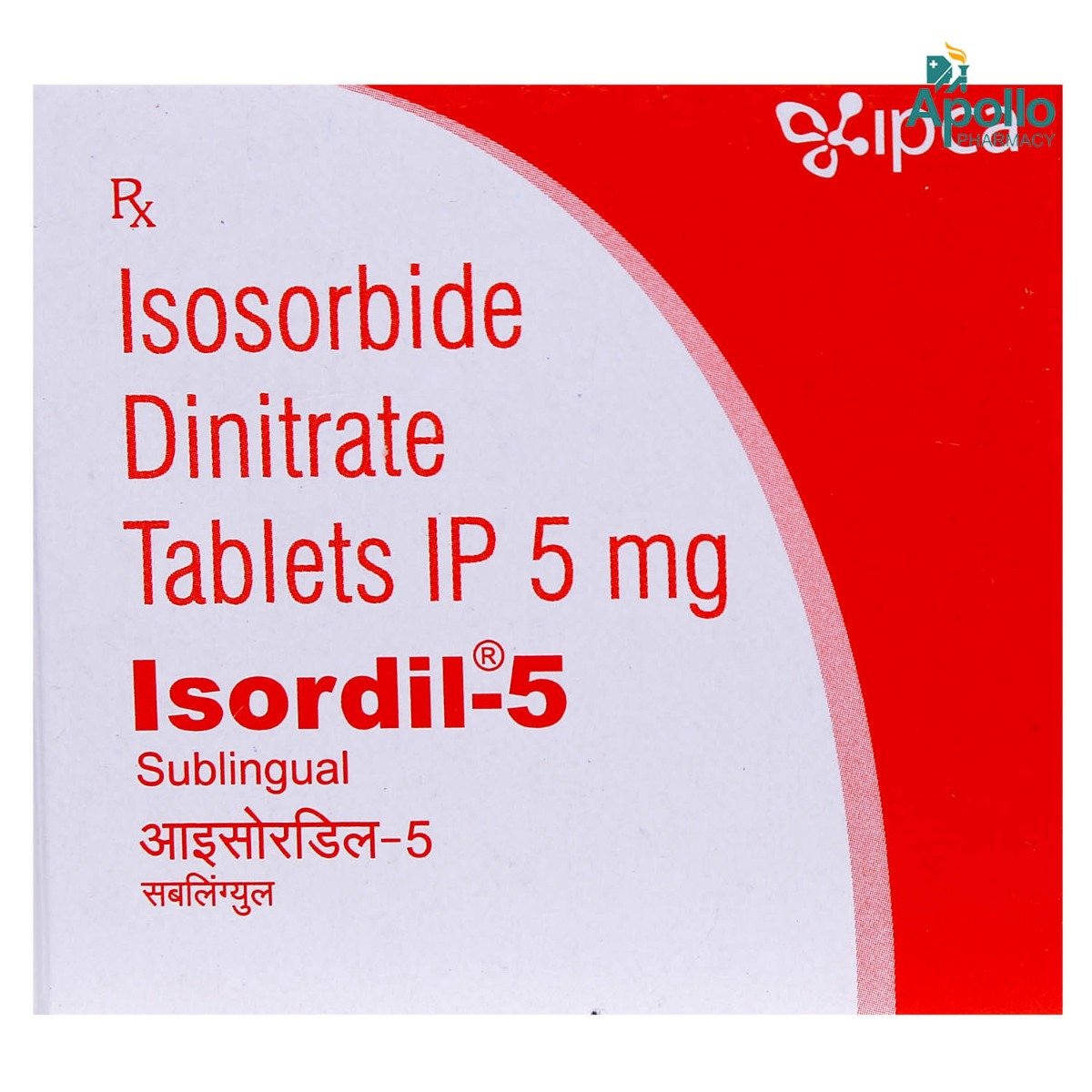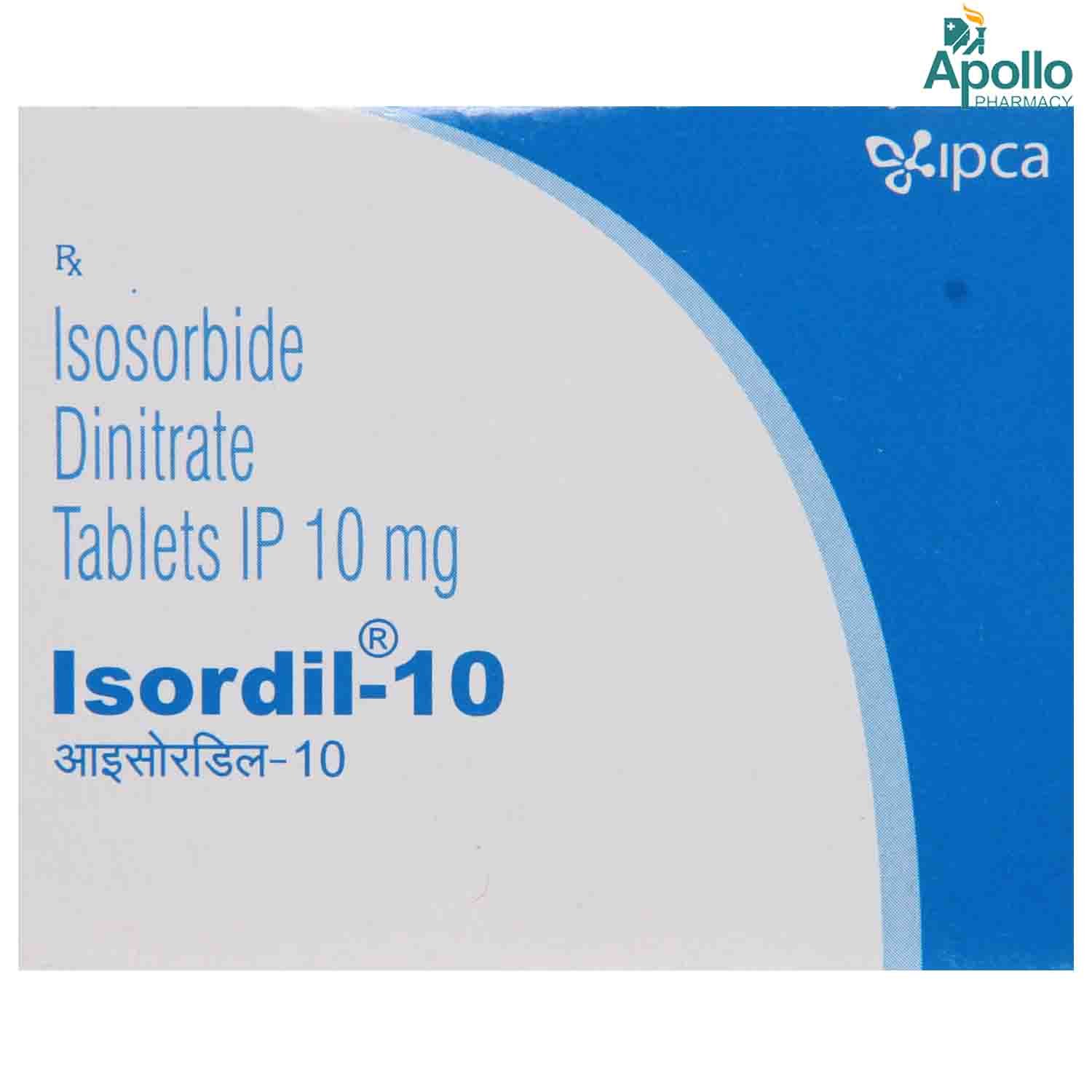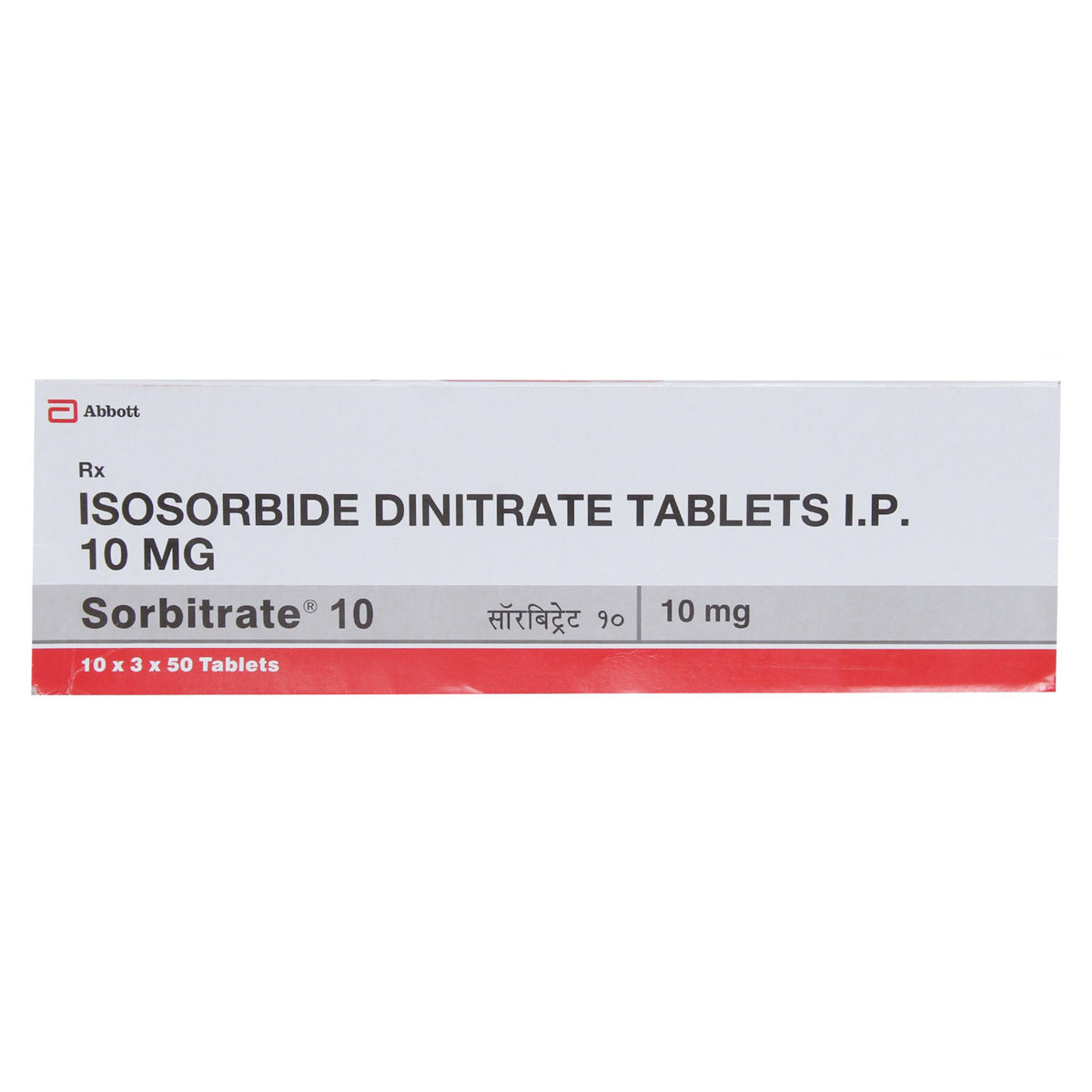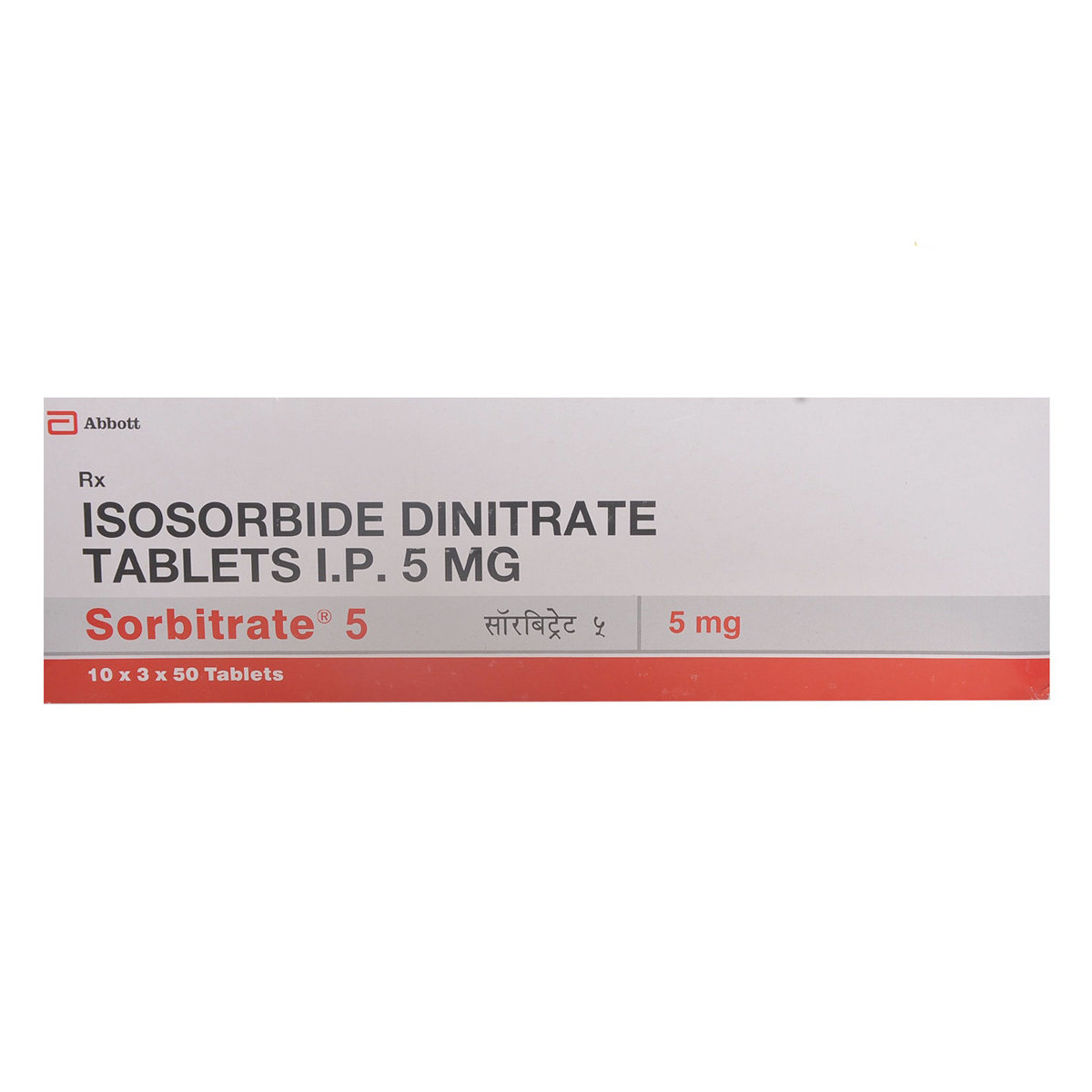Isosorbide Dinitrate
About Isosorbide Dinitrate
Isosorbide Dinitrate belongs to the class of blood pressure-lowering medications called ‘nitrate vasodilators’ used in the prevention of angina (heart-related chest pain) or heart failure. Angina pectoris (angina) is chest pain occurring due to reduced blood flow to the heart (coronary artery disease). It occurs when the blood vessels supplying the heart are blocked or narrowed.
Isosorbide Dinitrate contains ‘isosorbide dinitrate’ which works by dilating, relaxing, and widening the constricted blood vessels, thereby increasing the blood and oxygen supply to the heart. Thus, it effectively helps prevent the risk of future heart attack and stroke in the future, especially in high blood pressure patients.
Take Isosorbide Dinitrate as prescribed. Your doctor will advise you on how often you take Isosorbide Dinitrate based on your medical condition. The common side-effects of Isosorbide Dinitrate are headache (during initial days of therapy) and flushing (reddening of the skin, especially the face). These side effects usually disappear without requiring medical attention. However, consult your doctor immediately if these effects persist or worsen.
Do not take it if you are allergic to ‘isosorbide dinitrate’ or any ingredients of it. Do not use in patients with severe heart failure, severe hypotension (low blood pressure), bleeding in the brain, severe dehydration, heart valve problems, progressive heart failure due to chronic lung disease, severe anemia (low levels of iron), and severe hypoxemia (low levels of oxygen in the blood). Inform your doctor if you have an underactive thyroid gland, glaucoma (an eye condition), or head injury. Inform your doctor if you are taking other prescription or non-prescription medicines, especially medicines used to treat erectile dysfunction in men. Isosorbide Dinitrate contains lactose, so inform your doctor if you have an intolerance to some sugars. Also, inform your doctor if you are pregnant or breastfeeding.
Uses of Isosorbide Dinitrate
Medicinal Benefits
Isosorbide Dinitrate contains ‘isosorbide dinitrate’ which is a ‘nitrate’ and a vasodilator. It acts by dilating and relaxing the constricted blood vessels due to increased blood pressure (hypertension). This effect helps in improving the blood and oxygen supply to the heart, thus decreasing the risk of angina or heart-related chest pain. Thus, Isosorbide Dinitrate prevents the risk of chest pain in heart conditions like coronary artery disease.
Directions for Use
Storage
Side Effects of Isosorbide Dinitrate
- Headache
- Flushing (redness of the skin, especially the face)
- Low blood pressure
- Dizziness
Drug Warnings
Do not take Isosorbide Dinitrate if you are allergic to ‘isosorbide dinitrate’ or its contents. Do not take it if you have severe low blood pressure, bleeding or increased pressure in the brain, severe dehydration, heart valve problems, inflammation of the heart wall, high blood pressure due to long-term lung disease, and severe anemia. Before taking Isosorbide Dinitrate, inform your doctor if you have glaucoma (increased pressure in the eye), glucose 6 phosphate dehydrogenase deficiency (a type of anemia), underactive thyroid (hypothyroidism), kidney or liver problems, head injury, hypothermia (low body temperature), or intolerance to some sugars. This medicine should not be used with medicines used for erectile dysfunction like sildenafil or tadalafil. Inform your doctor if you are pregnant or breastfeeding.
Drug Interactions
Drug-Drug interactions: Isosorbide Dinitrate should not be used with organic nitrate drugs used to treat erectile dysfunction (sildenafil, vardenafil, tadalafil, and avanafil) and medicine used to treat pulmonary hypertension (riociguat), medicines to treat high blood pressure (norepinephrine), phenothiazines, and antiallergic medications.
Drug-Food interactions: Intake of foods containing high amounts of sodium should be reduced.
Drug-Disease interactions: Isosorbide Dinitrate use is contraindicated in conditions such as acute myocardial infarction or congestive heart failure, severe hypotension (low blood pressure), severe anemia, bleeding in the brain, and severe dehydration.
Drug-Drug Interactions Checker List:
Safety Advice

Alcohol
cautionAlcohol may worsen the condition by increasing the risk of side-effects. So, do not take alcohol

Pregnancy
cautionIsosorbide Dinitrate is a category C medicine and may cause harm to the fetus. It should be used in pregnant women if clinically needed and when benefits outweigh the risks.

Breast Feeding
cautionIsosorbide Dinitrate should be used with caution in breastfeeding mothers.

Driving
cautionIsosorbide Dinitrate may cause dizziness and affect your ability to drive. So, avoid driving or operating heavy machinery while using Isosorbide Dinitrate.

Liver
cautionIsosorbide Dinitrate should be used with caution in patients with liver diseases. Dose adjustments may be required in severe liver disease patient.

Kidney
cautionIsosorbide Dinitrate should be used with caution in patients with kidney diseases. Dose adjustments may be required.

Children
caution$should not be used in children unless clinically needed. Dose adjustments may be necessary.
Habit Forming
Diet & Lifestyle Advise
- Eat plenty of fresh fruits and vegetables. Opt for whole grains rather than refined or polished grains. Choose lean proteins, such as skinless chicken and fish. Opt for non-fat or low-fat dairy products.
- Do not take food containing high levels of sodium (salt).
- Drink plenty of fluids to prevent dehydration.
- Maintain a normal weight. Shed excess weight by exercising regularly for at least 30 min a day.
- Manage stress.
- Limit alcohol intake and quit smoking.
Special Advise
- Isosorbide Dinitrate may cause orthostatic hypotension (low blood pressure on standing). So, do no rise up quickly from a sitting or lying position suddenly.
- You may develop tolerance to Isosorbide Dinitrate with time, meaning that the same dose may be less effective next time. Follow the prescribed dosing schedule to avoid this.
- Keep all appointments. Your doctor will monitor your condition during the follow-up visits while taking this medication.
Patients Concern
Disease/Condition Glossary
Angina pectoris: It is the medical term for heart-related chest pain. It occurs when there is a reduction in blood supply to the heart due to the blockage of one or more arteries (coronary heart disease). Patients with angina often explain chest pain as squeezing, tightening, or pressure in the chest. Other symptoms can be dizziness, sweating, heartburn, and difficulty breathing.
FAQs
Isosorbide Dinitrate is a 'vasodilator' and can prevent angina effectively. It works by relaxing the muscles of blood vessels. It helps to dilate the narrowed blood vessels resulting in increased blood and oxygen supply to the heart. This prevents heart-related chest pain known as angina.
Isosorbide Dinitrate is used to prevent angina attacks. However, it cannot stop the angina attack that has already started as it works very slowly (delayed onset of action).
Isosorbide Dinitrate may decrease blood pressure (hypotension). So it should not be used in patients with severe hypotension.
Lisinopril is a medication used to treat high blood pressure. Using Isosorbide Dinitrate with lisinopril may cause a decrease in blood pressure (hypotension). So, consult your doctor before taking other medications while using Isosorbide Dinitrate.
Use of Isosorbide Dinitrate together with sildenafil is not recommended as it may cause a sudden decrease in blood pressure leading to loss of consciousness, even leading to coma stage.
Isosorbide Dinitrate is given for heart-related chest pain (angina), a life-long or chronic disease, especially in high blood pressure patients and coronary heart disease (CAD). So, do not stop taking Isosorbide Dinitrate even if you feel better. It would be best if you took Isosorbide Dinitrate until your doctor tells you to stop.
Isosorbide Dinitrate is sometimes used only when needed, you may not be on a dosing schedule. If you are on a schedule, take the missed dose as soon as you remember or if it's nearly time for your next dose, skip your missed dose. Do not use extra medicine to make up a missed dose.







